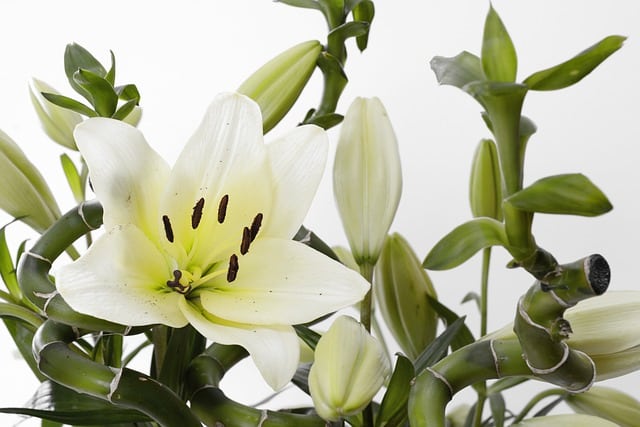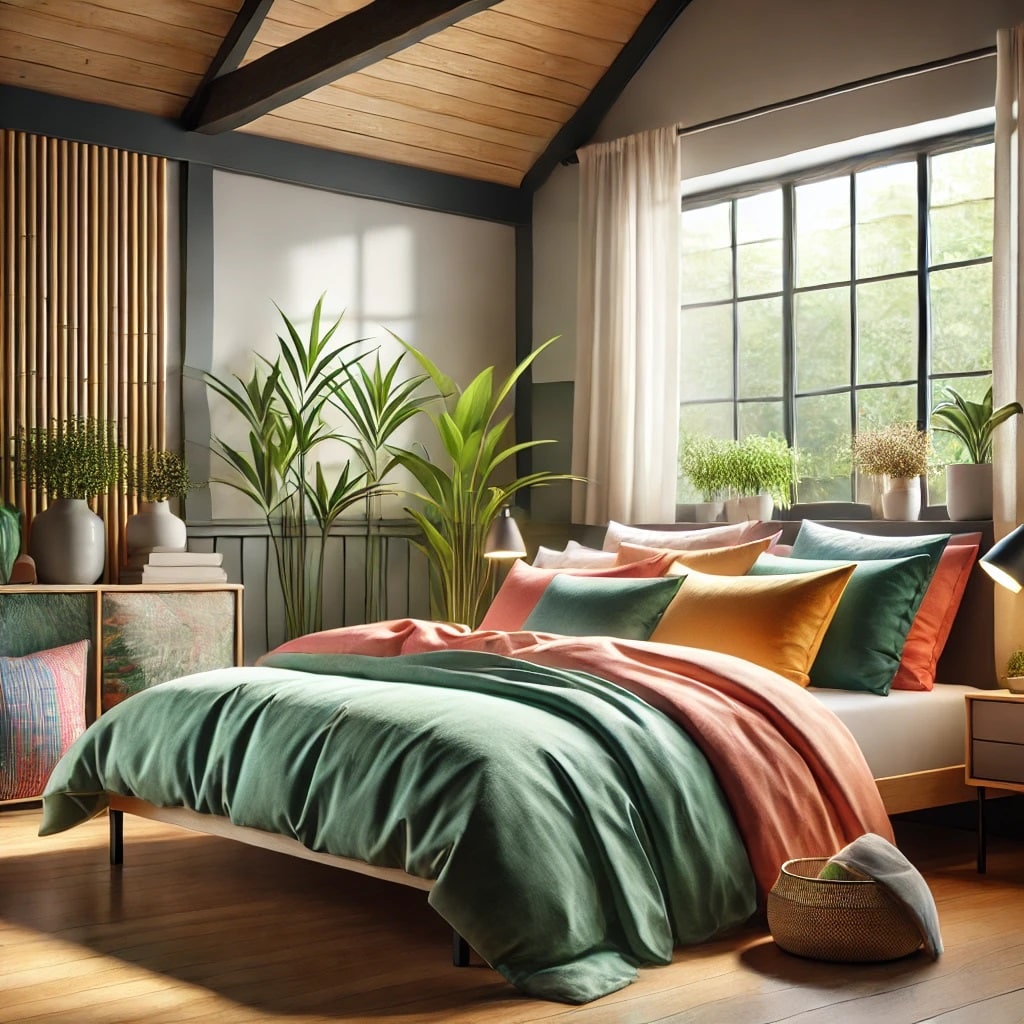If your sheets have ever left your skin feeling itchy, tight, or just uncomfortable, you’re not alone. Many people with sensitive skin wake up feeling worse instead of rested. The culprit? Often it’s the fabric against your body. That’s where bamboo sheets come in. They’re soft, breathable, and naturally kind to your skin.
Choosing bedding that helps instead of harms can make a big difference, especially if you deal with eczema, allergies, or nighttime overheating. If you’re curious how they compare to other skin-safe options, this article on bamboo sheets for sensitive skin breaks it down further.
What This Page Covers
Why Bamboo Sheets Are Skin-Friendly
Smooth Fibers Feel Better on Skin
Bamboo fibers have a naturally round, smooth structure. That means less friction and irritation when you move around in bed. The result? Less redness, fewer flare-ups, and more comfort overnight.
Naturally Hypoallergenic
They help keep allergens like dust mites and pet hair at bay, which can make a real difference for allergy-prone sleepers. Bamboo fibers also contain fewer microscopic ends than rougher fabrics like wool or low-grade cotton, so they’re gentler against sensitive or broken skin.
Great for Sensitive, Acne-Prone, or Eczema-Prone Skin
Bamboo sheets are breathable and moisture-wicking, so they don’t trap heat or sweat. That’s good news for anyone with acne, eczema, or other skin conditions where excess moisture and friction can lead to irritation. Many people with eczema report fewer flare-ups and more comfort with bamboo’s smooth texture.
Antibacterial Properties Help Keep Skin Calm
Bamboo has natural antibacterial properties, though these may lessen during processing into viscose or rayon. Still, many users say bamboo sheets feel fresher longer, needing fewer washes. That can help reduce exposure to bacteria that irritate sensitive skin.
Naturally Temperature-Regulating
Bamboo adjusts with your body’s temperature—it wicks away heat and sweat in summer, and holds in warmth during cooler nights. That consistency helps keep your skin balanced and comfortable through seasonal changes.

What About Allergies or Reactions?
It’s rare, but some people experience skin irritation with bamboo sheets, usually because of the way they’re processed. Low-quality bamboo fabric can leave behind chemical residues that trigger a reaction.
To avoid that, stick with OEKO-TEX or GOTS-certified bamboo sheets. These labels mean the sheets were tested for harmful substances and are generally safer for sensitive skin. And if you’re wondering about unusual fabric sensitivities, here’s a closer look at allergy triggers in bamboo bedding.
Tip: Always wash your new sheets before sleeping on them, just to remove any leftover residues from packaging or manufacturing.
Quick Tip: What Certifications to Look For
- FSC (Forest Stewardship Council): For responsibly sourced bamboo.
- OEKO-TEX Standard 100: Tested for harmful substances.
- GOTS (Global Organic Textile Standard): Organic fibers and eco-friendly processing.
Bamboo vs. Cotton vs. Microfiber: What’s Gentler on Skin?
Here’s a quick breakdown to compare bamboo sheets with two other popular options:
| Feature | Bamboo Sheets | Cotton Sheets | Microfiber Sheets |
|---|---|---|---|
| Hypoallergenic | Yes | Sometimes | Rarely |
| Moisture-Wicking | Excellent | Moderate | Poor |
| Skin Softness | Very Soft | Varies | Soft, but less breathable |
| Antibacterial | Yes (may reduce with processing) | No | No |
| Chemical Residue Risk | Low (certified) | Moderate | High (low-end) |
Choosing the Right Bamboo Sheets for Your Skin
- Look for terms like 100% bamboo viscose, bamboo lyocell, or organic bamboo.
- Prioritize certifications like OEKO-TEX or GOTS.
- Avoid products with added synthetic blends or wrinkle-resistant finishes.
- Read reviews for comments on softness and durability after washing.
What This Might Look Like in Real Life
If you usually wake up sweaty or itchy, bamboo’s smooth weave and cooling feel might be just the upgrade you didn’t know you needed.
You might also notice fewer pillowcase breakouts or less redness around your cheeks in the morning—small but meaningful changes that come from sleeping on a fabric that doesn’t rub your skin the wrong way. That’s why many hot sleepers also turn to cooling bamboo twin sheets for relief on warm nights.
Any Downsides? Here’s What to Know
Like any bedding, bamboo sheets aren’t perfect. Here are a few trade-offs, plus how to work around them:
- Wrinkle Easily: Bamboo wrinkles more than cotton. A quick tumble in the dryer or smoothing by hand can help.
- Limited Color Range: Fewer color options since the fabric doesn’t take dyes as easily. Brands that use plant-based dyes often have better selection.
- Delicate Seams: The flexible fibers may cause seams to loosen. Washing in a mesh bag helps protect them.
- Higher Price Point: They can cost more upfront, but last longer if cared for properly.
Care Tips to Keep Them Soft and Skin-Safe
- Wash with mild, fragrance-free detergent.
- Avoid bleach and fabric softeners—they break down the fibers and can irritate skin.
- Use cold water and a gentle cycle.
- Air dry when possible, or tumble dry on low.
- Wash separately from towels and other heavy fabrics to avoid pilling.
- Store in a breathable cotton bag or cool, dry drawer to prevent musty odors.
Bamboo Sheets Are Also a Greener Option
Bamboo grows quickly, doesn’t need much water, and usually requires no pesticides.
Did You Know? Most bamboo bedding is made from bamboo viscose or lyocell. Lyocell is produced using a closed-loop process that reuses water and solvents instead of dumping them. It’s the more eco-friendly option and better for people with sensitive skin too. Most bamboo bedding is made from bamboo viscose or lyocell, with lyocell being the more eco-friendly option due to its closed-loop processing system. This process captures and reuses water and solvents rather than releasing them into the environment, making it safer for both people and the planet. But not all bamboo fabric is made the same way.
If eco-friendliness matters to you, look for sheets made using a closed-loop process. These are gentler on the environment and on your skin.
Also check if the brand mentions carbon-neutral shipping or biodegradable packaging—these are small but meaningful touches for conscious shoppers.
Frequently Asked Questions About Bamboo Sheets
- What is the downside to bamboo sheets? They wrinkle more easily, can cost more upfront, and sometimes use chemical processing. Choosing high-quality brands helps minimize these issues.
- Is bamboo better than cotton? Bamboo is softer, more breathable, and wicks moisture better—great for hot sleepers or sensitive skin. Cotton is more durable and easier to find in a wider color range.
- Are bamboo sheets antibacterial? Bamboo has natural antibacterial properties, although they may diminish during manufacturing. Many still notice fresher-feeling sheets between washes.
- How long do bamboo sheets last? With proper care, high-quality bamboo sheets can last 4–6 years or more. Wash gently and avoid harsh detergents to extend their lifespan.
- How can you tell good quality bamboo sheets? Look for certifications (like OEKO-TEX), 100% bamboo viscose or lyocell labeling, and customer reviews mentioning durability and softness after washing.
- Are bamboo sheets good for summer? Yes. They’re naturally breathable, moisture-wicking, and temperature-regulating—perfect for hot nights.
- Why do my bamboo sheets smell? If washed improperly or stored damp, they can develop odors. Always dry fully and avoid storing in airtight plastic.
- Can you wash bamboo sheets in hot water? It’s best to avoid hot water. Use cool or warm water and low dryer heat to prevent shrinkage and damage.
The Bottom Line
If you’ve been searching for bedding that feels good, supports your skin health, and actually improves how you sleep at night, bamboo sheets are a smart choice. They’re breathable, soft, and naturally hypoallergenic, which makes them a great fit for sensitive, acne-prone, or allergy-prone skin.
Need help choosing? Take a look at my favorite bamboo bedding picks and see which set feels right for you.
Choose a certified, high-quality brand and take care of your sheets the right way, and your skin will thank you.

Kristin is the founder of Eco Bamboo Living. She shares honest, research-backed guides and product reviews to help readers find bamboo products that are truly sustainable, practical, and worth bringing into their homes.

